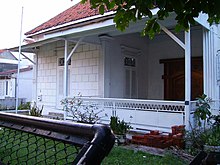Israelitische Gemeente Soerabaia
It has been suggested that this article be merged into Surabaya Synagogue. (Discuss) Proposed since December 2023. |

Israelitische Gemeente Soerabaia (English: Israelite Congregation in Surabaya) is a Jewish association in Surabaya which was founded in 1923. It was founded by Iraqi Jews, who have historically made up most of its membership. The congregation had what was for years the only synagogue in Indonesia. The congregation was at its largest in the 1930s, when it had around 1000 members; after most of them emigrated by 1960, it has been reduced to a tiny fraction of its former numbers.
History[edit]
During the Dutch colonial period, there were hundreds of Jewish immigrants living in Surabaya, most of whom worked as government employees, soldiers or merchants.[1] Surabaya was an ideal place to live for immigrant Jews at that time because the Dutch colonial government protected and gave them civil rights without discrimination.
The Israelitische Gemeente Soerabaia was founded by Izak Ellias Binome Ehrenoreis Rechte Grunfeld and Emma Mizrahie on 31 July 1923, in Surabaya.[2][3] One of the first thing it established was a Jewish cemetery in 1926, one of only a handful in the Indies. By the 1930s the congregation seems to have reached its largest extent with around 1000 members.[4] However, during that time the congregation did not have an official synagogue space and weddings and bar mitzvahs would take place in private homes (especially that of Charles Mussry) or rented rooms in institutional buildings.[1][5] The community was persecuted during the Japanese occupation of the Dutch East Indies.[1]
After renting various rooms to use as a synagogue, the congregation bought Eigendom Verponding, an estate formerly owned by the Kruseman family in 1948 and established it as the new Surabaya Synagogue.[6] The estate was owned by Joseph Ezra Izaak Nassiem and the operation of the synagogue was supported by the Sayers family.[7]
Despite their purchase of a new synagogue, Jewish community in Surabaya never again reached their 1930s numbers and continued to decline in the 1950s. The congregation embraced Zionism and the newly independent state of Israel and flew Israeli flags at the opening of the building.[3] At first there was not a local rabbi to take up a position in the synagogue; eventually Ezra Meir, a rabbi of Iraqi descent living in Singapore, was recruited to take up the role.[1]
International and national events negatively affected the IGS and drove waves of emigration to Israel, the United States, Australia and the Netherlands throughout the 1950s. The Sinai War, Israel, the United Kingdom and France attacked Egypt to seize the Suez Canal, led to increased hostility against the Jewish community in Indonesia. However, the true end of a vibrant Jewish community in Indonesia and the steepest decline in IGS membership came about as a result of the Dutch-Indonesian dispute over Western New Guinea, which led to measures against "Dutch" people living in Indonesia and the nationalization of the property of many foreign nationals, including Dutch Jews.[1] The membership of IGS dwindled to around 100–150 by 1959, and to only 10 or so by the twenty-first century.[4][6][8] During that period of decline the IGS nonetheless remained the most viable Jewish congregation in the country; the Jakarta congregation essentially merged with it and the Surabaya synagogue remained the only one in operation.[8]
Despite the emigration of many adherents, the IGS is still considered to exist among a small community of descendants of the original group in the twenty-first century. The synagogue itself was sold and demolished in 2013, causing complaints from the remaining community members.[9]
See also[edit]
References[edit]
- ^ a b c d e Utama, Abraham (3 August 2016). "Riwayat Komunitas Yahudi di Surabaya". CNN Indonesia (in Indonesian). Retrieved 16 December 2023.
- ^ "Ned.-indië. Israelitische Gemeente Soerabaja". De Indische courant (in Dutch). Surabaya. 28 July 1923. p. 17.
- ^ a b "25 Jaren Israëliëtische Gemeente Soerabaja". Nieuwe courant (in Dutch). Surabaya. 1 March 1949.
- ^ a b "In Soerabaja bestaan vijf wereldreligies naast elkaar". Leeuwarder courant: hoofdblad van Friesland (in Dutch). Leeuwarden. 2 June 1960. p. 2.
- ^ "Joodsche gemeente Soerabaia". De Indische courant (in Dutch). Surabaya. 28 April 1934. p. 9.
- ^ a b Harsaputra, Indra (17 September 2013). "Group protests synagogue demolition". The Jakarta Post. Surabaya.
- ^ Ilawati (2018). Eksistensi Komunitas Yahudi Keturunan di Jakarta: Studi Tentang Komunitas UIJC (The United Indonesian Jewish Community) (PDF) (Bachelor thesis) (in Indonesian). Jakarta: UIN Syarif Hidayatullah.
- ^ a b "De Joodse gemeenschap in Indonesië". Nieuw Israelietisch weekblad. Amsterdam. 6 February 1959. p. 3.
- ^ "Sengketa Synagogue Yahudi Surabaya Berujung ke Polisi". Hukum Online (in Indonesian). 2014-02-25. Retrieved 2020-02-08.
